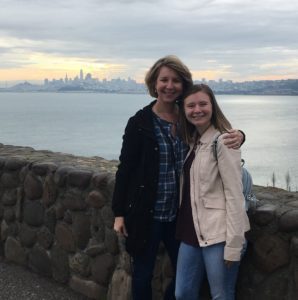In support of Mental Health Awareness Month, I asked my daughter Eva, 22, if we could share our journey with her depression and anxiety. We have traveled a long road from her junior year of high school to today, when she is poised to graduate from college. Along the way we have battled, cried, laughed, learned, and finally built a much stronger bond. Here is our reflection on that journey.
Is it teenage angst or something more?
What did it feel like during the period when you were most affected?
Eva: I felt like I could not function. I could do stuff, but I had no energy to give to anything. I remember going home and wanting to do homework, knowing I needed to do it, and physically was not able to do it. It felt like physical weights, like I was stuck in cement and couldn’t get out. It all felt 100 times more difficult — like I was trudging up the hill but never getting to the top.
Chris: I could see that you were struggling to function. All the things that had been easy for you were suddenly harder. Plus things you enjoyed — like choir and soccer — were treated like burdens. But I kept believing that it was just a phase and it would pass.
When did you realize that you had something more going on than teenage angst?
Eva: For me, one of the biggest things was having anger, frustration, and negative feelings impact different aspects of my life. I was taking those feelings out on other people. Typically I could keep my angst at home, but when it left the household, it was bad. No one told me that I was being unreasonable, but I would apologize to my friends, who were great. And they reassured me that it was just a bad day. But I knew it was more than that.
Chris: For me, the realization came at the end of your junior year, when everything just seemed to explode into extreme badness. We had battled all year to get you to focus on assignments and to stop asking for excuses to miss school. For a long time, I just assumed that it was hitting the “junior year wall” that I had read about, so I kept pushing. It really took you uninviting me to your athletic banquet along with asking to go to your aunt’s house during finals that really made me understand that we were dealing with something bigger than a typical rebellion or a challenging phase of life.
Eva: I had lost my core, the core part of my personality. It was gone. I knew I had lost who I wanted to be. I hated everything about myself, and I couldn’t fix it. I hated everything about it.
How did therapy address the way you felt?
Eva: When we had that huge fight, we both knew it was out of our hands. It was not healthy. I started with one therapist who was not very helpful because she wanted to discuss causes without providing any actions I could take. I didn’t know I had to possibly look at multiple therapists, but I did realize that I wanted something more regimented and structured to actively help me solve my problems.
Chris: I am very grateful that we found your therapist and that you continue to see her regularly. I do remember, though, that the first visit when we went together to establish the treatment, she basically told me that just because I could do something didn’t mean everyone else could. I was kind of annoyed that she reprimanded me in front of you, but I came to appreciate that bit of wisdom as I saw your whole demeanor begin to improve over the next few months.
When did adding medication come into the picture?
Eva: Therapy set a baseline, but after about a year, we made the decision for medication in conjunction with a psychiatrist. To treat my depression and anxiety, I started with the lowest dose of Zoloft until college (about a year and a half). My doctor then upped the dose at the beginning of my sophomore year, which I continue to take right now. Taking just medication would not have been the answer. The best way to help me live my most full life is a combination of therapy and medication. I would tell anyone to use the combination of therapy and medication (if medication is needed) and not one without the other.
Chris: It was a hard decision to introduce medication into the mix. I truly didn’t want to make you reliant on a pill to make you better when I knew that learning coping skills was necessary. But I could see once you started taking the medication that you were even more able to cope and keep yourself up and about in the world.
Eva: Most people on most days wake up starting at neutral, like at zero on a scale. Without medication I woke up in the negative — at less than zero — so I never had a chance to get out of the negative toward having a good day. Medication gives me a better chance to have good days.
What do you wish you would have done differently?
Eva: I would have started therapy sooner. You don’t have to have a serious reason to go to therapy. You can go to therapy just to go. You don’t have to believe you have a mental illness. I think we should look at therapy like getting your nails done or a haircut. It should be part of your self-care routine. Having an unbiased person to talk to, to vent to, with silly or serious stuff, is helpful. Talking and thinking through what’s going on in your life is learning about yourself, which is helpful whether you are doing great or troubled. Therapy is one of the greatest gifts, and it is underrated.
Chris: As a parent, it is a slippery slope to second guess yourself and your actions. I wish I had done two things differently: stopped pushing you so hard to just push through and joined you with my own therapy. You are not wired to push through in the same way I am, and it took me too long to realize that.
Eva: With the way I was feeling, I wanted to ask for help, but I couldn’t. It really took you to say we needed help for it to happen. The best route through all of this is communication. But it’s hard to meet each other at your pace, not putting pressure, watching tone of voice, and being open and honest.

What advice would you give to moms of teenage daughters to help them survive the turbulence?
Eva: Don’t take it personally. My negative behavior is not a judgement on you as a human, just your role in this phase of my life. Know that I don’t need you to solve my problems, but I just need you to listen and be there.
Chris: It is so hard not to take the negativity personally. Every fight or insult strikes deep at our perceptions of what kind of mother we should be. I would advise moms to try to put aside our perceptions that our children can handle what we handle in the same way we handle it. Even though we know our children are uniquely wired, I think we sometimes believe we can rewire them to handle the world the way we want it to be handled.
Eva: Going through that difficult teenage period helps us grow into a different phase of life. I would tell moms to hold on for the separation that ultimately comes because that helps the relationship get better. We’re going to miss you and call you. Before you know it, you’ll look up and see a young woman who you are so proud of. You’ll wonder how she learned all that, and you should know that it came from you.
We’re continuing this journey together.
Eva and I have used the skills we learned during our journey to make our quarantine less stressful (at least between the two of us). She paused me one day when discussing her summer plans to let me know she heard a “tone” in my voice. Even though I didn’t hear that tone, or even intend it, it was a polite way to ask me to consider what I was saying. A few years ago, we just would have argued and walked away.
Eva — my brave, smart, determined daughter — and I will continue to share our story in hopes that others might find some solace — or even inspiration — to keep talking, to keep seeking the right resources, to keep giving each other grace on this journey.












